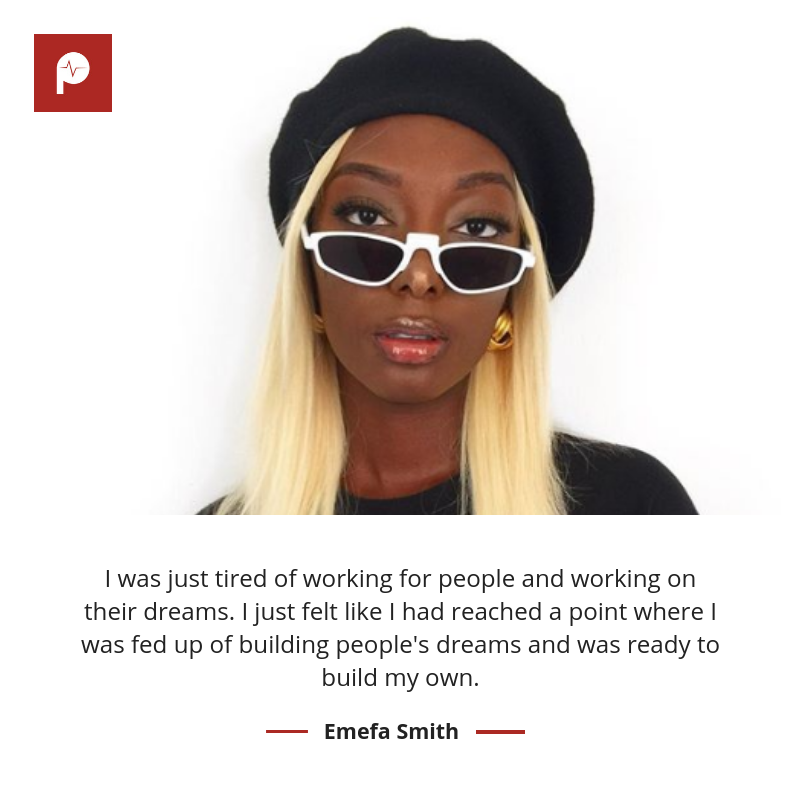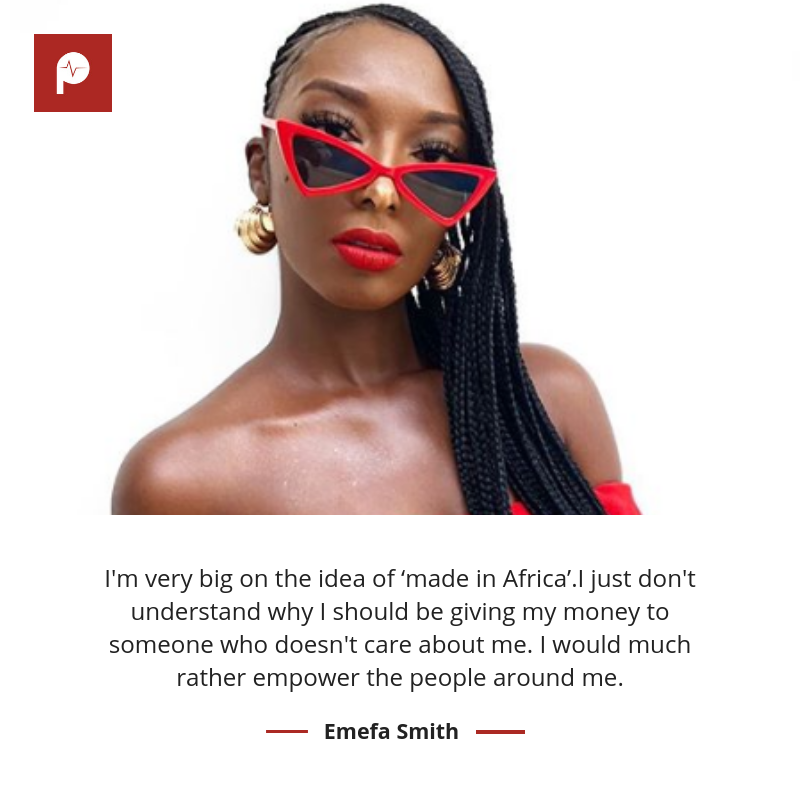Introducing Emefa Smith, the woman styling your alté faves with her popular accessories line, The Vintage Smith
![Introducing Emefa Smith, the woman styling your alté faves with her popular accessories line, The Vintage Smith [Credit: Instagram/ emefasmith]](https://image.api.sportal365.com/process/smp-images-production/pulse.ng/11082024/9df4c4b9-b530-457a-a2f4-c97665c0db54?operations=autocrop(700:467))
It has borne a new sound, new aesthetic and new approaches to fashion. One person leading the charge when it comes to style is Ghanaian export, Emefa Smith.
In just a couple of years, Emefa has built a formidable brand, The Vintage Smith, that has become a firm favourite among the alté set. Stars like BOJ, Wavy the Creator, Teezee and photographer Stephen Tayo have been spotted in her designs and as she announces plans to expand her brand even further, we sat down with her to find out how she grew her label to cult-like status.
The attraction of entrepreneurship

Where most people choose the security of a 9-5 and do their business as a side hustle, Emefa chose to launch head first into the murky waters of entrepreneurship. ‘’I was just tired of working for people and working on people's dreams. I just felt like I had reached a point where I was fed up of building people's dreams and was ready to build my own.’’
Emefa, a lover of fashion and with a very distinct sense of style herself, started her career in styling, working with artists like R2Bees, M.I Agbaga and ex-beauty queen Munachi Abii.
One would expect her foray into fashion to start with a clothing label but Emefa had other plans. ‘’Initially, when I came up with the idea, I wanted to start with clothes like everyone else. But then I realised that there was a gap in the market. Personally, I love sunglasses but I could only get sunglasses when I traveled. That was the only time that I could get sunglasses that I liked.
So when I went to New York in 2017, I had just quit my job. I was looking from the outside in, looking at Nigeria and Ghana and what we lacked and I realised that there was a huge gap for eyewear. I just took advantage of that and was like, I think this would be something that would be great to provide for people who actually want to look good without having to break the bank or having to travel.’’
After her breakthrough, Emefa faced the next hurdle which was finding a suitable supplier and establishing a production line that worked. Often, this part is one of the most challenging for budding entrepreneurs.
With not much support, Emefa decided to go it alone. ‘’I didn't have any advice. Actually, the advice that I had was from people who actually didn't believe in me at all. I basically started off researching on my own and trying to come up with suppliers. So I found a supplier in China Town, New York, and that's how it started. I went to a trade-show in Las Vegas where I had access to all these suppliers. Then I came back to New York, followed up, and then that's when I got my supplier.’’
Start-up statistics are daunting with research from the Small Business Association (SBA) showing between 30%-50% of small businesses fail within the first year.
From lack of adequate market research to poor financial planning and rigidity, many businesses don’t make it out of the gate.
Bearing that in mind, the success The Vintage Smith has had in just a couple of years is outstanding but we were curious to know the challenges Emefa faced when she first began. ‘’I would say that would definitely be customers because not a lot of people were aware that I was selling stuff. So it started by word of mouth and BOJ from DRB was one of my first customers. From there, people started talking about my brand and people became more aware.’’
The support of the music industry
Emefa’s ability to penetrate so far into the music scene is fascinating with the majority of her customers being musicians and artists.
‘’I think it's because I used to work in music. I used to work in Chocolate City. Prior to that most of my friends were actually musicians, so that was an organic progression for the brand. It wasn't something that was strategically planned, it just happened naturally.’’
Emefa has cornered the market when it comes to sunglasses and the goal of a business is to continue to grow and expand. We were curious to know the direction Emefa wanted to take and how she intended to get there.
’’Well, I don't know if I want a physical store because I feel like the idea of like shopping has really transcended into shopping online. People like the ease and just being a home and having things being delivered to them. So I would rather focus on my solely online.
I don't have a website which is crazy but I feel like I've done pretty well for myself considering that Instagram has been the only channel I’ve used. It’s been a combination of Instagram, pop- ups and word of mouth basically. However, I think that in the next couple of years, I would definitely like to have a fully functional website.’’
The Vintage Smith is definitely a brand that has made use of the way we shop in Nigeria through pop-ups put together by like-minded people who want to give opportunities to young entrepreneurs. People have been forced to think outside of the box when it comes to retail and through pop-up culture, many brands have been giving much needed platforms.
The collaboration era
Emefa talks rather excitedly about how she sees the brand developing over the next 5 years and pop-ups are still very much a part of the vision.
‘’I definitely want to do pop-ups overseas, you know, just not focus on Africa. It’s all about taking Africa to the world, you know, as cliche as that may sound. In the next five years I definitely want to be everywhere. I want to be doing stuff in London, New York, Paris, even South Africa because I have so many customers from all over the world and I want to give them the chance to have The Vintage Smith experience.’’
For Emefa, collaboration is an integral part of her brand’s future. Acknowledging the chances she has been given by others, she wants to pay it forward and connect with other creatives globally. ‘’I definitely want to visit like other places and connect with other creatives and other people that are interested in my stuff. The goal is to expand my reach, improve my distribution and just be everywhere. I'm definitely open to working with different creatives, I don't want to limit myself,’’
We wonder if her collaborations will be limited to accessories or if we will finally see her branch into clothing and share her unique style with the world.
‘’With accessories, I’m just putting my foot through the door because really, what I'm passionate about is fashion. I just tested the waters with the eye-wear and now I'm doing the bags.’’
The bags Emefa speaks of are bespoke, handmade beaded bags that have been spotted, dangling from the arms of the likes of Grace Ladoja MBE and TTYA founder Irene Agbontaen.
Though the have not been officially released, they are already the IT-bags for this year with the pre-orders stacking up. ‘’I definitely don’t want to be a purely accessories brand, I would definitely love to do clothes and work with other designers on collections but I feel like everything is just about finding the right time you know. As time goes on. you grow, you learn more about the business. Further in the future, I definitely see myself doing more than just eye-wear accessories.’’
For the culture
Emefa has been very vocal about the support she has received from the alté crowd who have championed her brand from the very beginning.
I wonder if she feels pigeon-holed by the label but Emefa insists she loves the new African style that has grown from the alté scene and how it has shaped her brand. ‘’I think it just like any other genre like punk or hip hop. So I feel like now, with this alté scene, people are identifying with that, It feels very African and it’s something that they don't have to try too hard to achieve you know.
You don't have to go through great lengths to achieve a certain style and that's where I come in. I help these people achieve a certain look.I just found myself in that kind of genre of music and yes it has shaped me as a human being and as a brand. It’s about how you present yourself so I would say that people would identify me as alté because all my friends are.’’
Talking about personal style, Emefa’s own is distinct. She often gets her own clothes made, drawing inspiration from the runway, social media and the looks she dreams up.
She explains that, although her style is quite trend-driven, she still doesn’t want to wear the same pieces as everyone else and her eye for style ensures that she gets in there first. ‘’I can spot a trend from a mile away and I can tell that something is going to be big. It’s my passion so it’s always been like this. I can always tell when something's going to be big so I just end up wearing it before it's everywhere.’’

Speaking about why she chooses to make most of her clothes instead of buying them, Emefa brings up the pertinent issue of sustainability and slow fashion.
Instead of plugging into the problematic fast fashion cycle, she prefers to empower African artisans. ‘’Being in Africa, having access to clothes is difficult as it is. It’s easier for people that live abroad to go online and shop. But, we are in Africa and I feel like fashion now is really big on sustainability.
We're right here and there people that can actually make these things that we see with all these big brands.
So, I would rather give my money to these people and I can work with local people in order to achieve my looks. I can go to my local fabric store, take that fabric to my local seamstress and let her make something with it. I'm very big on the idea of ‘made in Africa’.
I just don't understand why I should be giving my money to someone who doesn't care about me. I would much rather empower the people around me than give my money to a H&M for example.’’
Finally, when asked to describe The Vintage Smith in 3 simple words, Emefa reflects and finally says ‘’Alté, edgy, cool’’.
The reclamation of the word alté is fascinating to see. Whereas, it was used in a derogatory manner, people have flipped it around and wear it like a badge of pride. It seeps into every aspect of culture and has borne a new generation of creatives that are refusing to be bound by traditional standards of what it means to be an African.
Thanks to people like Emefa, culture pushers and style enablers, we are witnessing the rise of the new wave.
)
)
)
)
)
)
)

)
)
)
)
)
)